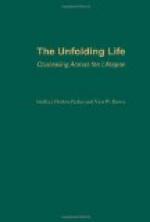An act compelled is like an apple tied to a fruit tree; it did not grow there and has no connection with the life of the tree. A fruit tree that can not bear its own fruit is worthless, and a life that does not reach the point of producing its own right actions, independent of human coercion, is a failure. The comparison may be pressed still further. No quantity of apples tied upon a tree will ever make it produce apples, and even so, no number of right acts imposed upon a child will, in itself, make him do right things voluntarily. This can only come through strengthening in his own soul the processes that lead to right action. The truth of this is proven in the case of thousands of boys who did the right things at home because they were compelled to do so, but when they left home they went wrong. The one who should have nurtured was too busy, or too thoughtless, to take the time to lead into strength and uprightness the thinking and feeling and choosing of the soul while it was developing. It was easier to say peremptorily, “Do this,” with the inevitable result, that when compulsion was removed character gave way because it was weak.
But some one is saying, “That is a very questionable doctrine; ’Let the child do as he pleases, if he don’t want to do the right, don’t force him.’”
Such a deduction from the argument entirely misses the point. The child must do the right, but, in a nutshell—which is the stronger constraint—outer or inner? Which makes character surer, the voice without, saying, ‘You must,’ or the voice within which says it? No external power could have made Paul’s record of service, or Brainerd’s or Paton’s. All the force of the Russian government was powerless to obtain that which each Japanese soldier poured out upon his country’s altar in the fight for supremacy in Manchuria. These deeds are the soul’s response to the most irresistible power in the world—a consuming passion. It was such a passion, intense beyond earthly fathom, that led the Savior through Gethsemane to Calvary.
Because this is so, the Heavenly Father’s effort to secure right action from His children is not evident in external compulsion. Through His favor and fellowship, the joy of His approval, the peace that passeth understanding, the “Well done,” the eternal reward, He endeavors to arouse love for Himself and what He desires, in order that His will may be chosen.
According to this Divine pattern human nurture labors. At the very first, the parent must make choice for the child, but earlier than is usually appreciated, definite training may be begun. The loving smile of the mother and her known wish, her approval or disapproval, her recognition and encouragement, the knowledge that, “Whatsoever a man soweth that must he also reap,” gained through bearing the penalty or enjoying the reward of each choice, the right course made attractive in the story of some one who chose it, or, most magnetic of all, in the life of the one who is nurturing, all these will begin to arouse the inner constraint that compels, and with glad acquiescence the soul will say, “Necessity is laid upon me.”




